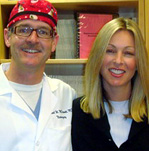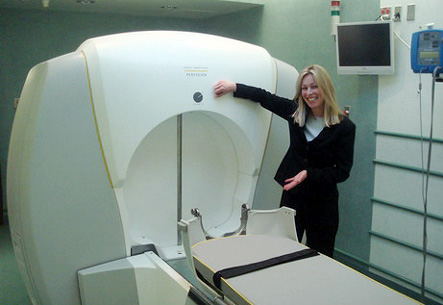
Michael McDermott, MD, and Liz Holzemer
The UCSF Meningioma Research Laboratory has received a $60,000 donation from Meningioma Mommas, a nonprofit organization committed to finding a cure for meningioma brain tumors.
The organization's founder, Liz Holzemer, presented a check to neurosurgeon Michael McDermott, MD, who holds the Robert and Ruth Halperin Endowed Chair in Meningioma Research, and Anita Lal, PhD, the laboratory principal investigator, on Jan. 8 in the UCSF Rosegay Library and Conference Center in the Department of Neurological Surgery.
"I'm honored to announce that Meningioma Mommas will help sponsor translational research conducted at the Meningioma Research Laboratory," said Holzemer. "There are very few clinicians and scientists studying this disease, so it is our mission to support these important efforts. I hope one day the work UCSF and other centers are doing will help reduce or stop this terrible disease."
A meningioma is a type of tumor that develops from the arachnoid layer of the meninges, the membranes that surround the brain and spinal cord. The majority of meningioma tumors (90 percent) are benign. However, when benign tumors grow, constricting and affecting the brain, they can cause headaches, seizures, neurologic deficits, disability and can even be life-threatening. Meningiomas vary in their symptoms and appropriate treatment options include surgery, radiosurgery and radiation therapy depending on where they are located. Meningiomas are more common in women than in men and most common in people between the ages of 40 and 70.
The Meningioma Research Laboratory at UCSF works to discover the genetic changes and abnormalities that cause the development of meningiomas. Current efforts of the laboratory include the identification of new cell surface receptor targets for therapy and testing new, generation-specific receptor antagonists on these targets. A large number of frozen tissue samples are available for review and a number of meningioma cell lines have been developed in the lab.
Supporting Translational Research
The money Meningioma Mommas raised for UCSF came from a donor who wished to remain anonymous. It will cover a one-year salary for a full-time research specialist to develop a clinical database. The database will be used by neurosurgeons to capture patient data and support long-term translational research on the disease.
 |
Brain tumor survivor Liz Holzemer, founder of Meningioma Mommas, came to UCSF recently to present a check to support research at the UCSF Meningioma Research Laboratory. |
"Liz Holzemer is an amazing individual who has helped to bring attention to a disease that is not well-known by the general public," said McDermott, who is also vice chair of UCSF's Neurological Surgery department. "Thanks to her dedication and generosity, we will be able to make further strides in understanding and combating meningioma."
Nearly eight years ago, Holzemer was diagnosed with a meningioma brain tumor. Holzemer's tumor was discovered after her attempts to start a family with her husband, Mark, a former pitcher for the Oakland A's. She underwent a successful surgery to remove the tumor eight years ago, and is today the mother of two children, Hannah, 6, and Hunter, 3.
"I often wished I'd met survivors before my surgery. If only I'd known what to expect," she said. "I dreamed of creating a forum where I could share my story and tell others that a brain tumor doesn't have to be a death sentence."
Following her recovery, Holzemer drew upon her experience as a writer and launched a website called Meningioma Mommas. Now 2,500 members strong, the organization will celebrate five years of operation on January 28.
Holzemer discovered work by researchers in the UCSF laboratory during her quest to learn more about the disease. Last year, she met McDermott at a neuroscience conference, where the two struck up an ongoing dialogue about meningiomas and the importance of funding basic and translational research to discover and support clinical treatments for the disease.
Recently, Holzemer visited the UCSF lab and met its team members, including principal investigator Lal, who leads efforts to explain the genetic changes underlying the development and progression of meningiomas.
"Meningiomas constitute 30 percent of primary brain tumors and are a considerable cause of morbidity and mortality because of their location and because of the existence of aggressive variants. Nevertheless, they remain a poorly understood tumor," said Lal.
"Our lab has made considerable progress in unraveling key changes underlying meninigioma tumorigenesis," added McDermott. "We are so grateful to Liz and Meningioma Mommas for supporting our research."
Related Links:
Meningioma Mommas
UCSF Meningioma Research Laboratory

